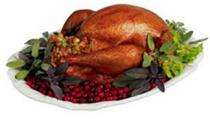Keep food safety in mind when preparing for holiday celebrations: expert

The holidays are a special time -- family, friends, food and more food. But many of the folks handling the preparations are not used to cooking for large groups, and it is easy for them to overlook some important practices, warns a food-safety expert in Penn State's College of Agricultural Sciences.
"Certainly, preparing food for large numbers of people often creates conditions in our kitchens with which we are not familiar," said extension food-safety specialist Martin Bucknavage. "Because of this, lapses in safe food handling and preparation can occur."
He noted that one of the most important things consumers can do is to properly plan and prepare before the event. "If we wait until the last minute, a forgotten ingredient or an overstocked refrigerator can result in some major confusion and possibly some contaminated food."
Bucknavage recommends taking the following seven precautions before a holiday party:
1. Decide on the recipes for the food you are going to make. Avoid using a recipe for a large group if you have not used the recipe before. If possible, try the recipe before the gathering. Also, make sure the recipes are accurate, according to accepted safe-food-preparation guidelines.
"Too often we find that recipes from less-reputable sources state incorrect cooking parameters, such as too-low cooking temperatures," he explained. "Recently, a friend used a recipe that stated a final cooking temperature for chicken that was 10 degrees lower than the USDA guideline of 165 degrees Fahrenheit. Missing this fact, the cook could have put his guest's health in jeopardy."
2. Set a schedule for buying ingredients. Most dry ingredients can be bought well before the event, but if you are buying fresh seafood, you will want to buy it a day or two before, at the most. "Actually, with seafood, it is probably better to buy frozen unless you are close to the source where the seafood is caught," Bucknavage said. "Make sure all ingredients are on hand before you begin cooking. You hate to be running out to the store when you have a pot cooking on the stove."
3. Make sure you have the proper equipment and supplies. The most important implement is a cooking thermometer. There is no better way to tell when a food item is fully cooked than with a thermometer, according to Bucknavage.
"For poultry, the temperature of the bird should be 165 degrees Fahrenheit or higher," he noted. "Also, make sure you have the right cooking equipment, whether it is a properly sized roasting pan or having several serving utensils for the side dishes you plan to serve. Have an adequate amount of aluminum foil and resealable plastic bags for handling leftovers."
4. Plan adequate time for thawing any frozen items, especially larger cuts of meat and poultry. There are a few proper methods for thawing. One is to thaw in the refrigerator, and this may take more than four days for a large, frozen turkey. You can also thaw a food item in running cool water.
"Thawing under running water is a good way to thaw frozen shrimp," said Bucknavage. "You also can thaw foods in the microwave, but be sure to continue cooking completely once thawed this way."
5. Clean out the refrigerator so there is adequate space for all of the refrigerated food items you plan to have, including food items your guests bring. "Too often, the refrigerator is too full, and we are forced to leave food out longer than it should be, or the refrigerator is so packed that it loses cooling capacity," he said. "If needed, have a cooler at the ready along with some bagged ice."
6. Prepare any shelf-stable food items such as cookies or breads a day or more in advance so that you can concentrate on those food items requiring more care, such as a roasted turkey. If guests ask if they can bring something, suggest shelf-stable items such as cookies or cakes. It is an easier, safer alternative.
If they wish to bring items that require refrigeration or cooking, make sure that you and the person preparing the food item have planned accordingly to properly transport, store and serve those items. "If refrigerated, keep below 40 degrees Fahrenheit; if hot, the temperature should be 140 degrees Fahrenheit or higher," he said.
7. On the day of the event, start early and have a plan. "Roasts often can take longer than expected, so get them going early," he said. "Besides, having the cooking done early will allow you more time to spend with your guests. Otherwise, they will be crowding in your kitchen to talk, and this can only add to the stress."
Prior planning and preparation will not only help reduce the risk of foodborne illness, Bucknavage pointed out, "but will help reduce the stress that occurs during your holiday gathering, ensuring that all -- including the cook -- have a happy holiday."















